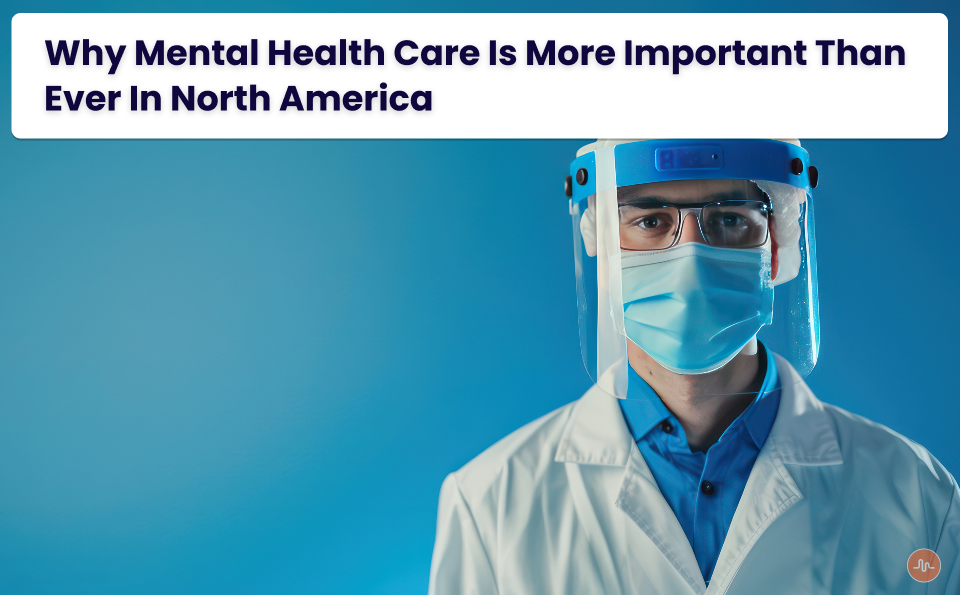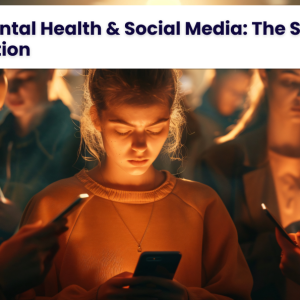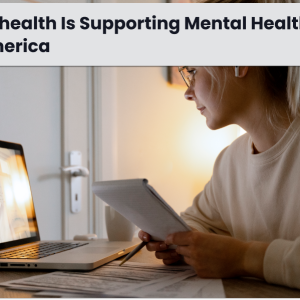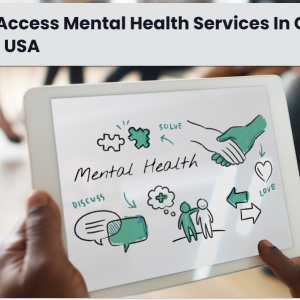
Why Mental Health Care is More Important Than Ever in North America
It’s early 2020, and the world is rocked by the rapid spread of a mysterious virus. At first, it’s just a distant concern—something happening in far-off places. But as days turn into weeks, and weeks into months, the reality sets in. The COVID-19 pandemic has arrived, and it’s no longer a question of “if,” but “how” it will impact the world.
Across North America, life begins to change in ways that were unimaginable before. Social distancing, lockdowns, and widespread fear become the norm. As the days stretch on, people are confronted with a new, invisible enemy: anxiety. The virus doesn’t just threaten physical health—it casts a shadow over mental well-being in ways that no one expected.
The Hidden Toll of Isolation and Fear
For months, families are separated. People work from home, children learn virtually, and social interactions are reduced to virtual screens. The vibrant streets of cities fall silent. The world seems to stop, but inside homes, a new kind of chaos begins. Loneliness and isolation take root in many hearts.
Imagine Sarah, a woman living alone in a bustling city. Before the pandemic, she would spend her evenings catching up with friends, attending yoga classes, and enjoying the occasional dinner out. But now, her apartment is eerily quiet. Social distancing means no visits, no hugs, no simple moments of connection. At first, she tells herself it’s just temporary. But as weeks stretch into months, the isolation starts to feel like an unbearable weight.
Sarah is not alone. Across North America, millions are feeling the emotional toll of the pandemic. Mental health conditions like anxiety, depression, and stress are on the rise. The Centers for Disease Control and Prevention (CDC) reports that more people are reaching out for help than ever before—but unfortunately, the system is overwhelmed. Long wait times and limited access to mental health services leave many feeling like they have nowhere to turn.
The Layers of Pain: Financial Strain and Trauma
And then there’s Tom, a small business owner who spent years building his dream. Like many others, his business is hit hard by the pandemic. His revenue plummets as customers stay home, and he’s forced to let go of employees. The pressure mounts—how will he pay his bills? How will he feed his family? The financial strain weighs heavily on his shoulders.
Tom’s story is all too familiar. The economic toll of the pandemic has left millions struggling with unemployment, financial instability, and uncertainty about the future. For many, the stress of making ends meet adds to an already overwhelming sense of anxiety. It’s not just the fear of the virus itself—it’s the fear of losing everything.
And then there’s grief. The pandemic has claimed countless lives, and for many families, it hasn’t just been the loss of a loved one—it’s been a loss of community. Funerals are held over Zoom, hugs are absent, and the collective grief that should be shared among family and friends is instead borne in solitude. This grief doesn’t go away—it lingers, leaving deep emotional scars.
The Overlooked Crisis: Healthcare Strain
Amidst this storm, the healthcare system strains to keep up. Hospitals are overwhelmed with COVID-19 patients, and mental health services are often pushed to the backburner. For those like Sarah and Tom, reaching out for help becomes a Herculean task. The systems are overburdened, and the wait for therapy sessions stretches weeks or even months.
This strain continues, particularly in rural and underserved areas, where access to mental health professionals is limited. The very people who need help the most are often the ones who are least able to get it.
The Consequences of Ignoring Mental Health
The damage caused by untreated mental health issues isn’t just emotional. It’s far-reaching, affecting people’s overall well-being, relationships, and even their physical health. Mental health struggles are often linked to substance abuse, homelessness, and an increased risk of suicide. The ripple effect is undeniable, and yet, for so long, mental health has been treated as secondary to physical health.
Moreover, untreated mental health issues have societal costs. Studies have shown that mental health struggles contribute to lower workplace productivity, increased absenteeism, and rising healthcare costs. It’s not just the individual who suffers—it’s society as a whole.
Mental Health as a Priority in Post-Pandemic Recovery
As North America begins its slow recovery from the pandemic, there’s a growing recognition that mental health care must be prioritized. The emotional scars left by COVID-19 can no longer be ignored.
Imagine a future where Sarah, Tom, and millions like them have access to the mental health care they need. Where resilience is built through therapy and support systems, where stigma surrounding mental health is diminished, and where emotional well-being is seen as just as important as physical health.
This is the future we need to create—one where mental health services are as readily available as any other form of healthcare. Governments, healthcare providers, and communities must work together to ensure that people have access to mental health resources that are affordable, accessible, and stigma-free.
Technology: A Beacon of Hope
There’s a glimmer of hope amid the struggle. During the pandemic, teletherapy and mental health apps became lifelines for many people. For Sarah, it’s been a way to connect with a therapist she might not have otherwise had access to. Virtual support groups provide a sense of community when physical spaces are out of reach. These technologies are helping bridge the gap in mental health care access, especially for those in underserved areas.
But while technology has its place, it’s important to remember that it’s not a replacement for in-person care. The human connection that happens face-to-face is invaluable. It’s essential that we use technology to complement and enhance the mental health care system, rather than replace it.
The Path Forward: A Healthier, More Resilient Society
The pandemic has changed us all. It has highlighted the fragility of our mental health systems and underscored the importance of emotional well-being. As we move forward, mental health care must be at the heart of our recovery. By making it a priority, we can create a society that is not only physically healthy but emotionally resilient—ready to face whatever challenges the future may hold.
It’s time to build a world where people like Sarah and Tom can access the support they need to heal and thrive. A world where mental health is no longer a stigma, but a cornerstone of our collective well-being. This is the future we can create—if we start prioritizing mental health now.
Summary
Mental health care is becoming a necessity rather than a luxury in post-COVID North America. The pandemic has brought to light the vulnerabilities in the mental health of many people as well as the flaws in the current system of care. By giving mental health care first priority, we can create a society that is more empathetic and resilient and where people have the resources and assistance they need to overcome the trauma caused by COVID-19 and go on to prosper in the years to come. To ensure that mental health care is available, inexpensive, and stigma-free and to create the groundwork for a healthier, more equitable future governments, communities, and individuals must collaborate





